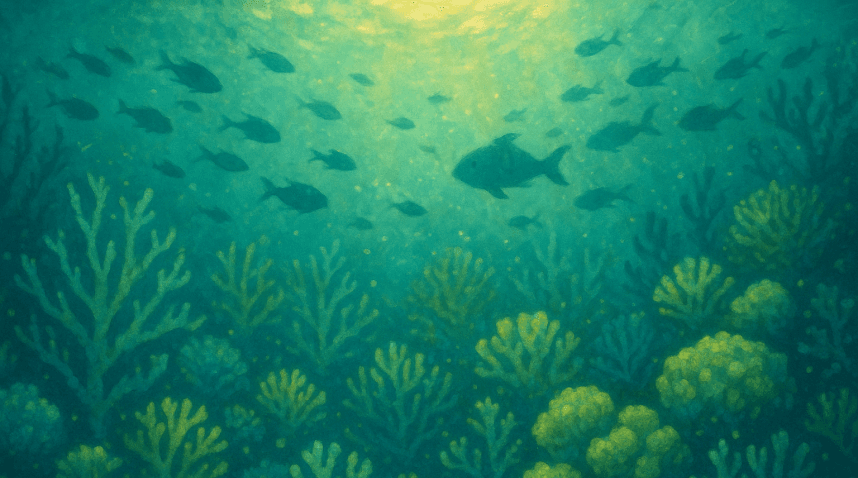TLDR: Earth Day is more than a campaign — it’s a reminder to live with wisdom and compassion for all beings, including our planet. This article shares five everyday ways to practise metta towards nature.
The practice of metta, or loving-kindness, invites us to extend compassion to all beings — not just people, but also the animals, forests, rivers, and oceans we share this world with.
One way I feel deeply connected to nature is through scuba diving. Beneath the surface, everything slows. There is no noise or striving. You become aware of your breath, your movements, and the quiet rhythm of the ocean. The mind softens. Presence arises naturally. Beauty reveals itself without effort.
Yet even here, there are reminders of impermanence. I’ve seen coral reefs lose their colour. I’ve picked up drifting plastic in places that once felt untouched. I’ve come across abandoned nets and cages on the ocean floor, still entangling marine life — which we did our best to gently release.
These moments remind me that even the most peaceful places are shaped by choices made above the surface.
As Earth Day has just passed, I’ve been reflecting on how we can turn awareness into action not just for one day, but in the way we live each day.
Here are five simple ways we can extend loving-kindness to the Earth, beginning with our everyday choices.
1. Be intentional about consumption
In a world driven by urgency and overconsumption, the practice of slowing down reminds us to pause and reflect. The Earth is not a resource to be used, but a relationship to be nurtured.
Like all things, the natural world arises from conditions, just like us. It is deeply connected to our well-being.
Before making a purchase, ask: Do I really need this?
Waiting 1-2 weeks before making a purchase is helpful for taming the sudden cravings to make purchases.
Choosing simplicity and embracing santutthi, the joy of contentment, helps us to lessen our craving and lighten our footprint.
2. Make conscious daily choices to reduce waste

The Dhamma reminds us that even small actions shape the world we live in.
Dhammapada verse 122: One should not think lightly of doing good, imagining ‘A little will not affect me’; just as a water-jar is filled up by falling drops of rain, so also, the wise one is filled up with merit, by accumulating it little by little.
In Singapore, in 2023, about 6.86 million tonnes of solid waste were generated. Only 12 percent of household waste was recycled. One-third of this came from packaging — much of it single-use plastic and cardboard.
These numbers are a quiet call to action.
Carrying a reusable bottle or container may seem small, but over time, these choices matter. Choosing items with less packaging, supporting businesses that prioritise sustainability, and saying no to disposables are gentle ways to reduce harm.
When done with intention, these habits become part of our practice.
3. Respect our marine life

More than 70 percent of our planet is water. The ocean is not just scenery. It is a living system with its own intelligence and balance.
Many Singaporeans are surprised to learn how rich our marine biodiversity is. Our waters are home to over 250 species of hard corals — more than a quarter of all known coral species worldwide. We also host more than 100 species of reef fish, 200 species of sponges, and over half the region’s seagrass species.
This biodiversity isn’t far away. It’s right here, along our shores.
If you haven’t already, consider visiting Sisters’ Islands Marine Park or Chek Jawa. Join a guided intertidal walk. Observe coral nurseries. Pause and appreciate the life around you.
If you’re a diver like me, follow a simple rule: take nothing, leave only bubbles. I use reef-safe sunscreen, avoid touching marine life, and dive with operators that prioritise sustainability.
4. Choose ethical tourism that protects, not exploits
Tourism can either uplift or harm the ecosystems and communities we visit.
Before booking a dive or snorkel trip, take time to ask: Does the operator brief guests on responsible behaviour? Do they limit group sizes to reduce environmental stress?
If you’re visiting an elephant sanctuary in Thailand, here’s one clear rule — no riding.
Ethical sanctuaries do not allow elephants to perform tricks or carry tourists. They give them space to roam, forage, and live naturally. Visitors observe from a respectful distance.
By choosing ethical operators, our travels can honour what we came to experience, not contribute to its harm.
5. Conserve electricity and water out of love, not just cost
We can be more intentional in how we use energy. Switch to LED lighting and energy-efficient appliances. Use fans instead of air-conditioning, or set the aircon to 25°C.
Where possible, dry clothes on a line rather than using a dryer. It’s a small habit, but one that adds up over time.
Caring for the Earth is not separate from the spiritual path. It is part of it.
Each mindful choice — refusing plastic, not supporting establishments that offer riding of elephants, floating quietly among coral — becomes a reflection of compassion, wisdom, and responsibility.
In the end, protecting the planet is not just a duty.
It is a reflection of who we are and the values we choose to live by.
Wise Steps:
- Pause before purchasing. Ask yourself: Do I really need this? Waiting 1–2 weeks helps tame craving and supports conscious consumption.
- Refuse single-use items. Carry a reusable bottle, container, and utensils to reduce everyday waste.
- Dive and travel mindfully. Use reef-safe sunscreen, don’t touch marine life, and choose responsible tour operators.
- Say no to animal performances. Skip elephant rides and attractions that exploit wildlife. Respect their right to live naturally.


